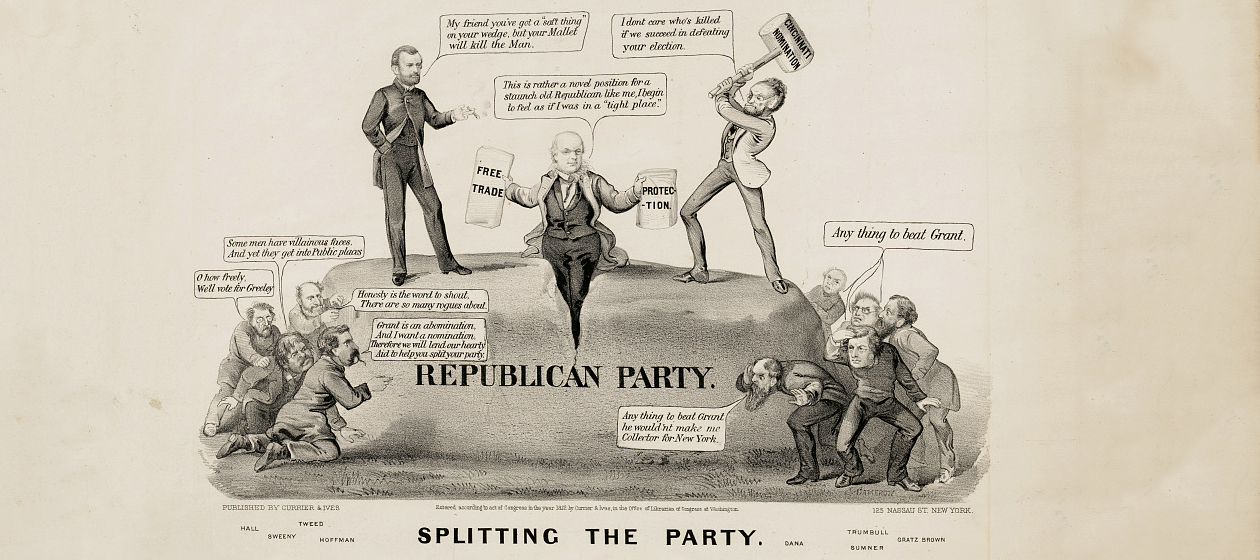Liberal Republicans are the last thing we need
Wishful thinking is not wise moderation


A free daily email with the biggest news stories of the day – and the best features from TheWeek.com
You are now subscribed
Your newsletter sign-up was successful
Classical liberalism is having a moment of sorts. With conservatism severely tainted in intellectual circles by its association with President Trump, right-wing ideologues like Jordan Peterson have taken up "classical liberalism" as a handy branding opportunity.
David Frum has the latest entry in The Atlantic arguing for a return of a liberal Republican Party. With classical liberal values disappearing from both political parties, "illiberalism seems to be spreading — and not only on the nationalist right, but also on the intersectional left," he argues, and liberal Republicans should step into the gap.
Frum, a former neoconservative and speechwriter for George W. Bush, has genuinely broken with Trump and the GOP on some domestic policy (though not so much on immigration or foreign policy). But this brand of liberalism is the last thing America needs.
The Week
Escape your echo chamber. Get the facts behind the news, plus analysis from multiple perspectives.

Sign up for The Week's Free Newsletters
From our morning news briefing to a weekly Good News Newsletter, get the best of The Week delivered directly to your inbox.
From our morning news briefing to a weekly Good News Newsletter, get the best of The Week delivered directly to your inbox.
First off, classical liberalism is a pretty slippery phrase. But as a matter of history, it can be summarized with John Locke's ideas that people have a "natural right" to "life, liberty, and property" — enshrined in the Declaration of the Rights of Man and of the Citizen early in the French Revolution, which spread liberal ideas around the globe — combined with the economics of Adam Smith and David Ricardo. The implication of life and liberty was (and is) contested, but as the 19th century progressed into the 20th the idea increasingly connoted political democracy with the usual panoply of civil rights — universal suffrage, freedom of speech, association, due process, and so on.
The right to property, meanwhile, provides the moral underpinning for classical political economy. Smith, Ricardo, and their descendants portrayed the capitalist economy as a self-regulating system best left to its own devices — that is, with property owners, workers, and buyers exchanging goods and services in markets.
It's immediately apparent that property is potentially in tension with life and liberty. Most obviously, for humans to live they need access to material resources — food, water, and shelter at least — on a daily basis. But to live a truly healthy life, citizens need more than a daily bread ration and a cup of water; they need a fair share of the nation's material production.
In its most utopian form, classical liberalism insists that such problems of distribution are impossible — that any government "interference" with the economy would destroy the whole economic system. But because classical liberal capitalism only distributes income to workers and owners, the plight of people who cannot work and own no property — mainly children, the elderly, or disabled people — was grim indeed in the liberal heyday. And things got terrible even for people who could work when capitalism fell victim to one of its periodic mass unemployment crises, as in 1837, 1857, 1873, 1893, 1907, or 1929.
A free daily email with the biggest news stories of the day – and the best features from TheWeek.com
When faced with such a crisis, one has to choose between preserving property and the self-regulating market, or preserving life and liberty — that is, taking some deliberate state action to restore employment and rescue the population from the malfunctioning economy. The record of classical liberals on this question is pretty wretched. Some admitted the need for moderating institutions like the welfare state, but many others effectively abandoned liberty and life to protect property. It was famed liberal John Stuart Mill, after all, who argued on the grounds of the self-regulating market that there should not be a state response to the Great Famine in Ireland, which killed a million people and forced a million more to emigrate (thus decreasing the Irish population by about a quarter).
One of the most notorious examples of this in American history were the Liberal Republicans, a splinter party which attempted to team up with Democrats to oust Republican Ulysses S. Grant from the presidency in 1872. Southern Democrats at the time were quite literally in the midst of a murderous terrorist campaign to suppress the votes of Southern black voters — incidentally, also the most reliable Republican demographic bloc. But, poisoned by racism and elitism, Liberal Republicans were willing to toss American blacks to the KKK to get free trade and civil service reform.
It is rather astonishing that Frum does not discuss this etymological antecedent to his desired ideology, because these questions are not at all irrelevant to today. Not in the form of Jim Crow terrorism, of course, but in the basic tradeoff between liberty and property. Here's Frum's description of the values that are being lost:
Free trade. International partnerships. Honest courts and accountable leaders. Civil rights and civil liberties. Private space for faith but public policy informed by science. A social-insurance system that cushions failure and a market economy that incentivizes success. [The Atlantic]
In other words, the politics of Barack Obama and Hillary Clinton. One immediate issue, obviously, is that we just had two presidential terms of that, and the results were bad enough that it lost to a hideously unpopular reality TV star.
And why were they so bad? By far the largest factor was centrist Democrats getting cold feet over interfering too much with the economy, in the form of running too large a budget deficit after the worst financial crisis in 80 years. The resulting economic and social carnage wrecked Democratic fortunes in the 2010 midterms and set the stage for the rise of Trump, as the eurozone crisis did for the far-right parties in Europe.
The economic problem with classical liberalism is that it creates devastating crises and extreme inequality. Its political problem is that its bedrock ideology pushes strongly against the policy necessary to fix those crises.
Nowhere does Frum grapple with these issues, instead posing this brand of liberalism as a political philosophy of adults as against the angry rabble on left and right. It's no more likely to succeed than before.
Ryan Cooper is a national correspondent at TheWeek.com. His work has appeared in the Washington Monthly, The New Republic, and the Washington Post.
-
 What to know before filing your own taxes for the first time
What to know before filing your own taxes for the first timethe explainer Tackle this financial milestone with confidence
-
 The biggest box office flops of the 21st century
The biggest box office flops of the 21st centuryin depth Unnecessary remakes and turgid, expensive CGI-fests highlight this list of these most notorious box-office losers
-
 What are the best investments for beginners?
What are the best investments for beginners?The Explainer Stocks and ETFs and bonds, oh my
-
 House votes to end Trump’s Canada tariffs
House votes to end Trump’s Canada tariffsSpeed Read Six Republicans joined with Democrats to repeal the president’s tariffs
-
 How are Democrats trying to reform ICE?
How are Democrats trying to reform ICE?Today’s Big Question Democratic leadership has put forth several demands for the agency
-
 Is Alex Pretti shooting a turning point for Trump?
Is Alex Pretti shooting a turning point for Trump?Today’s Big Question Death of nurse at the hands of Ice officers could be ‘crucial’ moment for America
-
 Halligan quits US attorney role amid court pressure
Halligan quits US attorney role amid court pressureSpeed Read Halligan’s position had already been considered vacant by at least one judge
-
 House approves ACA credits in rebuke to GOP leaders
House approves ACA credits in rebuke to GOP leadersSpeed Read Seventeen GOP lawmakers joined all Democrats in the vote
-
 The billionaires’ wealth tax: a catastrophe for California?
The billionaires’ wealth tax: a catastrophe for California?Talking Point Peter Thiel and Larry Page preparing to change state residency
-
 Vance’s ‘next move will reveal whether the conservative movement can move past Trump’
Vance’s ‘next move will reveal whether the conservative movement can move past Trump’Instant Opinion Opinion, comment and editorials of the day
-
 Bari Weiss’ ‘60 Minutes’ scandal is about more than one report
Bari Weiss’ ‘60 Minutes’ scandal is about more than one reportIN THE SPOTLIGHT By blocking an approved segment on a controversial prison holding US deportees in El Salvador, the editor-in-chief of CBS News has become the main story
